Throughout your personal injury case, you are likely to encounter terms and phrases that are unfamiliar to you. While it is always most beneficial to talk to your personal injury attorneys at Fisher & Associates P.C., who will ensure that you understand the information presented to you during your lawsuit, we have put together a list of key terms that will help you during your case.
Contingency Fee
You may have heard of hourly attorney fees or retainer-based services. A contingency fee is a different type of payment structure where the client pays the attorney only when money is recovered for that client. In the event that no money is recovered, the client pays no attorney fees.
Damages
Insurance companies will evaluate claims based on the amount of damages. Damages can include medical expenses, accrued mileage, lost wages and non-economic damages. If you are involved in a car wreck, it’s important to keep track of any and all out-of-pocket expenses related to the collision. Non-economic damages are the most difficult to quantify. These can include pain and suffering, as well as any changes or effects the accident has had on your personal life.
MedPay
Most auto insurance policies include a MedPay provision, which covers a portion of medical expenses if you are involved in a collision. The most common amount afforded is $5,000, unless you have a very high insurance policy. When you select a policy, you are given the opportunity to either accept or deny this portion of your policy. MedPay can be very beneficial to victims of auto accidents because it is not subrogable. This means that you are not under any obligation to repay an auto insurance carrier for any payments made under the MedPay portion of the policy.
Subrogation
This is defined as the ability of one party (i.e. your insurance company) to make a payment that is owed by another party (i.e. the at-fault party’s insurance company) and then collect on that amount after the settlement. When you are involved in a motor vehicle collision, your insurance companies – health and auto – may cover the cost of your treatment to ensure that you receive timely treatment for your injuries. However, the responsible or at-fault party will be required to pay the subrogation amount on those claims.
Lien
If you are involved in a personal injury matter and do not have health insurance, you may be required to sign lien documentation with a doctor before receiving treatment. A lien is a form of debt that must be paid back upon settlement. Some medical providers are willing to negotiate liens upon settlement, however some still require full payment for the charges incurred.
Treatment Gap
If you are involved in a personal injury matter and have unexplainable lapses in time between dates of treatment, this can be a red flag in your case. Insurance companies look at the frequency of your appointments when evaluating your claim. Sporadic doctors’ visits – visits with several months between them or a long period of time until beginning treatment – will be looked at as a negative aspect of your claim. If you are injured in an accident, it is very important to immediately seek medical attention and promptly follow up with any referrals or prescriptions that you are given.
The best thing you can do when you’ve been in a wreck is to seek help from the experienced attorneys at Fisher & Associates P.C. Understanding all of the legalities of your case requires the attention and experience that our attorneys will provide. Don’t let your insurance company intimidate you by using legal terms and phrases you’re unfamiliar with. Call us today for your free consultation and let us help you receive the compensation you deserve.

Recent Comments